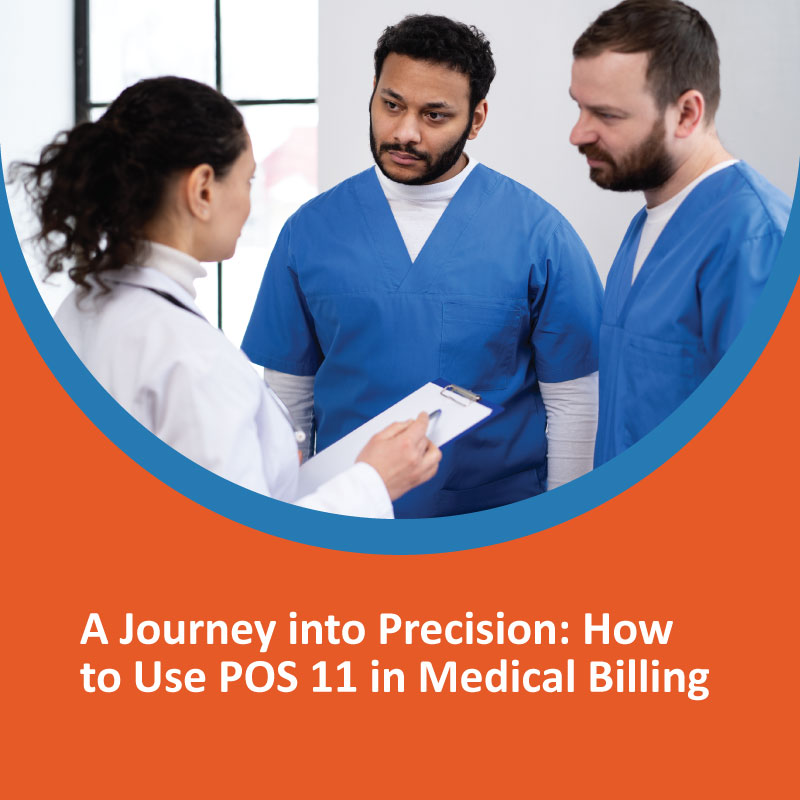For a practice’s financial health, correct coding is very important in medical billing. POS 11 in medical billing is an important code that is often missed. It is not just a number; it is the key to obtaining the exact amount of money back, following the rules, and running your business well. Let’s talk about what it does, how to use it, and the best ways to use it.
What you need to know about POS 11 in medical billing:
In medical billing, POS 11 stands for “Office.” It means that a doctor offered medical care in their own office, a group practice, or a stand-alone clinic. This outpatient setting offers a lot of regular medical attention. The difference between hospitals and other facility services is very important because it affects how insurance companies, including Medicare, handle claims and decide how much to pay. The first step to a smoother revenue cycle is to understand POS 11 in medical billing.
Why POS 11 in Medical Billing Changes the Game
Using POS 11 correctly in medical billing has a big impact on a practice’s financial health and efficiency.
Increasing the accuracy of reimbursements
Distinct insurance companies have distinct cost schedules for different types of care. Services at an office (POS 11) usually pay more for the professional component than services in a hospital outpatient department (POS 22). This covers the doctor’s overhead costs. Using the wrong POS code might cause underpayments, which means you lose money. Precise POS 11 in medical billing makes sure that the right amount is paid.
Making claims processing easier
Using POS 11 correctly in medical billing makes sure that claims are handled quickly. When the place of service information doesn’t line up, it typically leads to denials, delays, or demands for extra paperwork. These kinds of problems take up a lot of time for the administration and mess up cash flow. Accurate POS 11 in medical billing cuts down on these expensive problems.
Make sure you follow the rules.
CMS and commercial insurers have tight rules for POS codes when it comes to healthcare billing. Using POS 11 incorrectly in medical billing can cause problems with compliance, audits, and fines. Accurate coding shows that you follow industry standards, which protects your practice from being looked at. Integrity in POS 11 for medical billing is not up for discussion.
Clear Patient Cost Sharing
The POS code also affects how much money a patient has to pay. The amount you have to pay for a service and the amount you have to pay out of pocket may be different depending on where you get it. Using POS 11 correctly in medical billing makes billing clear for patients, which makes their experience better. This clear explanation of pos 11 in medical billing generates trust that is very important.
Services that are common to pos 11 in medical billing include a wide range of outpatient services.
- Checkups, wellness exams, and shots are all part of preventive care.
- In-office diagnostic services include blood tests, X-rays, and ultrasounds.
- Follow-up appointments: visits after surgery and to manage long-term health problems.
- Taking care of wounds, giving shots, and removing moles are all minor procedures.
- Consultations: They do specialist evaluations in their own office.
How to Handle Problems with pos 11 in medical billing
Even though it looks easy, using pos 11 in medical billing might be hard.
Putting the wrong service location
In medical billing, a common mistake is charging for a hospital treatment as POS 11. This happens a lot when a doctor’s office is on the same campus as a hospital but runs its own business. This difference is very important to avoid denials.
Confusion About Telehealth Coding
Telehealth is making things more complicated. Some payers enable POS 11 for medical billing with modifiers for virtual visits from the provider’s office, but most of the time, you need to use special telehealth POS codes like 02 or 10. To avoid using POS 11 incorrectly in medical billing, keep up with the latest telehealth rules.
Changes that depend on the payer
Not all insurance companies have the same regulations for POS 11 when it comes to medical billing. Policies for payers are different, so you have to do a study to make sure you’re following them. What is okay for one person might not be okay for another.
Documentation that isn’t accurate
It is very important to have accurate records. Errors in using pos 11 in medical billing can happen if patient records don’t clearly say where a service took place or if staff coding methods aren’t consistent.
Lack of training for staff
Errors in POS coding, like using POS 11 incorrectly in medical billing, are common since staff don’t get enough training and leave their jobs. Knowledge is very important to avoid making mistakes that cost a lot of money.
Best Practices for Mastering pos 11 in medical billing
These tips can help you get the most out of pos 11 in medical billing and avoid mistakes.
Careful checking of locations
Before making a claim, always make sure you know the specific service location. Is it really your office, or is it a clinic that is part of a hospital? For proper pos 11 in medical billing, this clarity is very important.
Keep up with the rules for payers.
Check each major payer’s precise needs for POS codes on a regular basis, especially for pos 11 in medical billing and telemedicine. Keep a reference guide up to date.
Invest in regular Staff Training: Give all coding and billing staff regular training. Make sure they know the details of pos 11 in medical billing and how it is different from other codes.
Use Technology Smartly
Use current practice management systems and electronic health records (EHRs) that can recommend POS codes. Manual verification of pos 11 in medical billing is still necessary, even though it is useful.
Do regular internal audits.
Check your claims from time to time to find code mistakes. Proactive auditing for pos 11 in medical billing helps find problems before they cause denials or formal audits.
Make sure that clinical documentation is thorough.
Make sure your clinical notes are clear and accurate and that they explain why the service is medically necessary. Strong documentation backs up your use of pos 11 in medical billing during audits.
Conclusion
In the medical field, accurate billing is quite important. POS 11 in medical billing may appear small, but it is a big part of getting the right payments, processing claims quickly, and always following the rules. Providers may turn pos 11 in medical billing from a problem into a powerful instrument for financial stability by learning about its function, dealing with problems, and using best practices. This focus on the small things isn’t just about getting paid; it’s also about making your practice healthier, one correct code at a time.
FAQ’s
1. What does “POS 11” mean?
POS 11 means “office.” It means a service done in a doctor’s office or clinic.
2. Why is POS 11 crucial for payments?
It has an effect on the rates of reimbursement. Office services (POS 11) usually pay more for professional components than hospital settings do, which helps offset the costs of running the business.
3. Can POS 11 be utilised for telehealth?
No, usually not. You normally need to use special telehealth POS codes, such as 02 or 10.
4. What are some common faults people make when using POS 11?
Billing hospital services as POS 11, coding telehealth services wrong, and not keeping good records are all mistakes.
5. What can my practice do to make POS 11 more accurate?
Check the service location often, stay up to date on payer rules, train workers, use billing software, and do internal audits.



